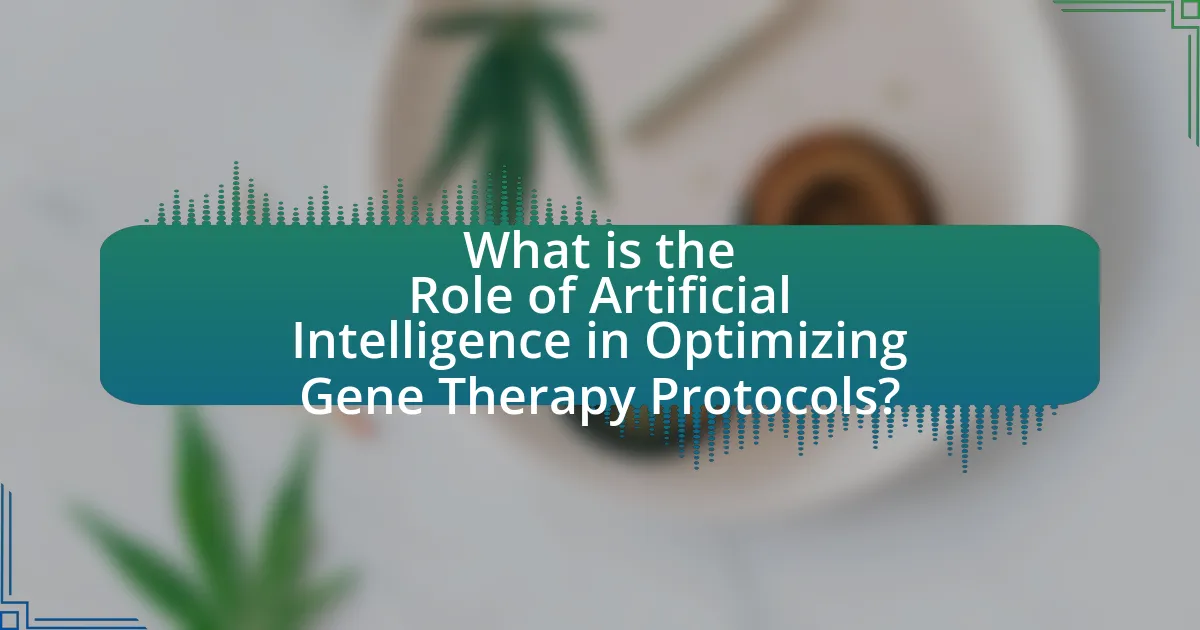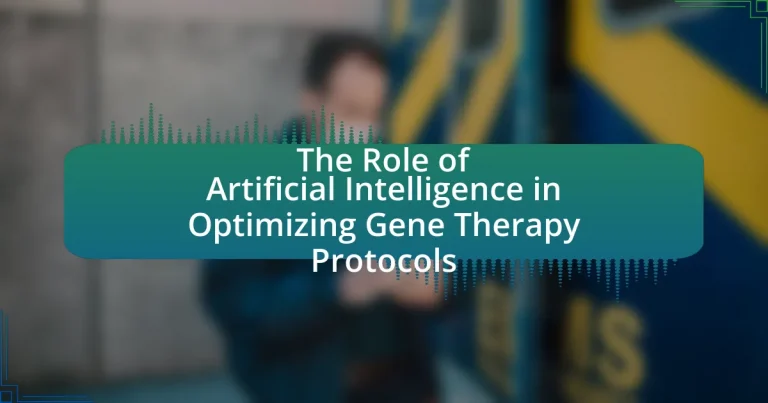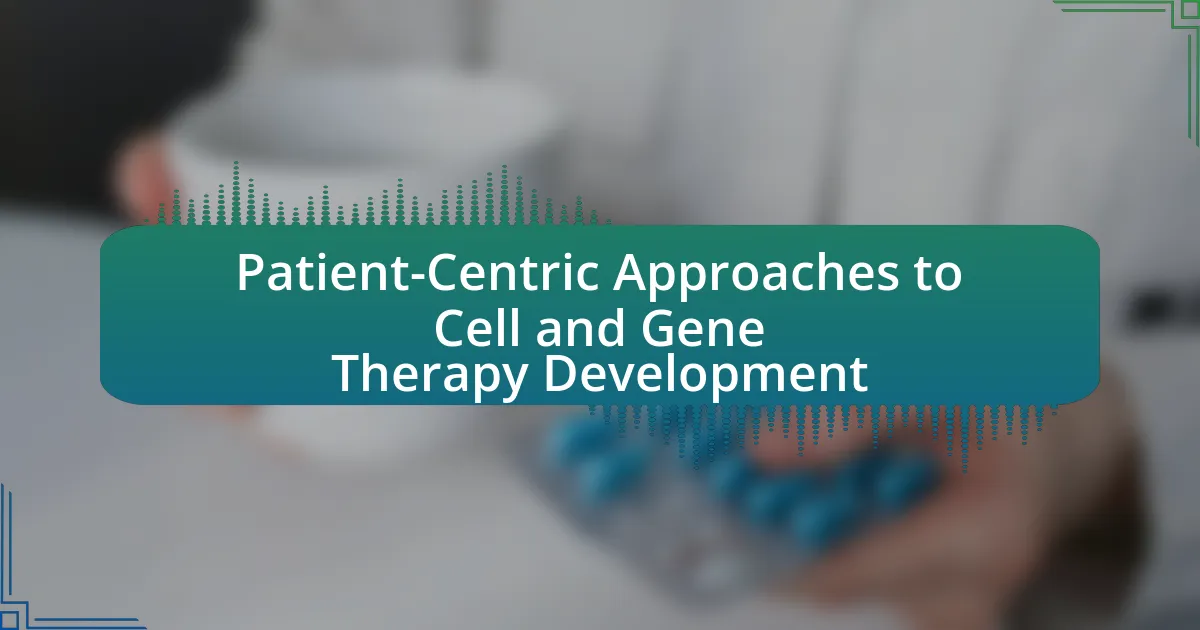The article focuses on the role of Artificial Intelligence (AI) in optimizing gene therapy protocols. It highlights how AI enhances precision in gene editing techniques, personalizes treatment plans, and improves the efficiency of gene delivery systems through predictive modeling and data analysis. Key AI technologies, such as machine learning and natural language processing, are discussed in relation to their applications in identifying effective gene targets and predicting treatment outcomes. The article also addresses challenges in gene therapy that AI can mitigate, including patient stratification and off-target effects, while considering ethical implications and best practices for implementation. Overall, it emphasizes the transformative impact of AI on the future of gene therapy.

What is the Role of Artificial Intelligence in Optimizing Gene Therapy Protocols?
Artificial Intelligence plays a crucial role in optimizing gene therapy protocols by enhancing the precision of gene editing techniques and personalizing treatment plans. AI algorithms analyze vast datasets, including genomic information and patient responses, to identify the most effective gene targets and delivery methods. For instance, machine learning models can predict the outcomes of specific gene modifications, thereby reducing trial-and-error approaches in clinical settings. Research has shown that AI can improve the efficiency of CRISPR technology, allowing for more accurate edits with fewer off-target effects, as demonstrated in studies published in journals like Nature Biotechnology. This integration of AI not only accelerates the development of gene therapies but also increases their safety and efficacy for patients.
How does Artificial Intelligence contribute to gene therapy optimization?
Artificial Intelligence contributes to gene therapy optimization by enhancing the design and delivery of therapeutic genes through predictive modeling and data analysis. AI algorithms analyze vast datasets from genomic studies to identify potential gene targets and optimize vector design, improving the efficiency of gene delivery systems. For instance, machine learning techniques can predict the best delivery methods and assess patient-specific responses, leading to personalized treatment plans. Research has shown that AI can significantly reduce the time and cost associated with developing gene therapies, as evidenced by studies demonstrating improved success rates in clinical trials when AI-driven approaches are utilized.
What specific AI technologies are utilized in gene therapy?
Specific AI technologies utilized in gene therapy include machine learning algorithms, natural language processing, and deep learning frameworks. Machine learning algorithms analyze large datasets to identify patterns in genetic information, which aids in predicting treatment outcomes. Natural language processing is employed to extract relevant information from scientific literature and clinical trial data, enhancing the understanding of gene therapy applications. Deep learning frameworks, particularly convolutional neural networks, are used for image analysis in gene editing techniques, such as CRISPR, to improve precision and efficiency. These technologies collectively enhance the design, optimization, and implementation of gene therapy protocols.
How does AI enhance the precision of gene editing techniques?
AI enhances the precision of gene editing techniques by utilizing machine learning algorithms to predict off-target effects and optimize guide RNA design. These algorithms analyze vast datasets of genomic sequences, allowing researchers to identify potential unintended edits and refine the targeting accuracy of CRISPR systems. For instance, studies have shown that AI-driven tools can reduce off-target mutations by up to 90%, significantly improving the safety and efficacy of gene editing applications.
What are the key challenges in gene therapy that AI addresses?
AI addresses several key challenges in gene therapy, including the optimization of gene delivery systems, patient stratification, and the prediction of off-target effects. Gene delivery systems often face inefficiencies in targeting specific cells; AI algorithms can analyze vast datasets to identify the most effective vectors for specific conditions. Additionally, patient stratification is crucial for personalized treatment; AI can process genetic and clinical data to categorize patients based on their likelihood of responding to therapies. Lastly, predicting off-target effects is essential for safety; AI models can simulate interactions at the molecular level, helping researchers anticipate unintended consequences of gene editing. These applications demonstrate AI’s significant role in enhancing the efficacy and safety of gene therapy protocols.
How does AI improve patient selection for gene therapy?
AI improves patient selection for gene therapy by analyzing large datasets to identify genetic markers and patient characteristics that predict treatment response. Machine learning algorithms can process genomic data, clinical histories, and demographic information to stratify patients based on their likelihood of benefiting from specific gene therapies. For instance, studies have shown that AI can enhance the identification of suitable candidates by up to 30%, leading to more personalized and effective treatment plans. This data-driven approach minimizes trial and error in patient selection, ultimately improving outcomes and resource allocation in gene therapy applications.
What role does AI play in predicting treatment outcomes?
AI plays a crucial role in predicting treatment outcomes by analyzing vast datasets to identify patterns and correlations that inform clinical decisions. Through machine learning algorithms, AI can process patient data, including genetic information, treatment histories, and demographic factors, to forecast how individuals will respond to specific therapies. For instance, studies have shown that AI models can achieve accuracy rates exceeding 90% in predicting responses to cancer treatments by utilizing data from clinical trials and patient records. This capability enhances personalized medicine approaches, allowing for tailored treatment plans that improve patient outcomes.
What ethical considerations arise from using AI in gene therapy?
The ethical considerations arising from using AI in gene therapy include issues of consent, privacy, and potential biases in data. Consent is critical, as patients must fully understand how AI algorithms will influence their treatment decisions. Privacy concerns stem from the handling of sensitive genetic data, which could be misused if not properly protected. Additionally, biases in AI training data can lead to unequal treatment outcomes, disproportionately affecting certain populations. For instance, if AI systems are trained predominantly on data from specific demographic groups, they may not perform effectively for others, raising fairness and equity issues in healthcare access.
How can AI ensure compliance with regulatory standards in gene therapy?
AI can ensure compliance with regulatory standards in gene therapy by automating data analysis and monitoring processes. By utilizing machine learning algorithms, AI can analyze vast datasets to identify patterns and ensure that gene therapy protocols adhere to established guidelines. For instance, AI systems can track patient outcomes and side effects in real-time, allowing for immediate adjustments to treatment protocols in line with regulatory requirements. Additionally, AI can assist in the documentation process, ensuring that all necessary records are maintained accurately and are easily accessible for audits, thereby facilitating compliance with regulatory bodies such as the FDA and EMA.
What are the implications of AI-driven decisions in patient care?
AI-driven decisions in patient care can significantly enhance treatment outcomes and efficiency. These decisions leverage vast datasets to provide personalized treatment recommendations, improving the precision of interventions. For instance, AI algorithms can analyze genetic information and patient histories to tailor gene therapy protocols, leading to more effective and targeted therapies. Research published in the journal “Nature Medicine” by Esteva et al. (2019) demonstrates that AI can outperform human experts in diagnosing certain conditions, showcasing its potential to improve diagnostic accuracy and patient management. Additionally, AI can streamline administrative processes, reducing wait times and optimizing resource allocation in healthcare settings.
How does AI integration affect the future of gene therapy?
AI integration significantly enhances the future of gene therapy by improving the precision of gene editing techniques and accelerating the discovery of therapeutic targets. Machine learning algorithms can analyze vast datasets to identify genetic mutations associated with diseases, enabling the development of tailored gene therapies. For instance, AI has been utilized in CRISPR technology to predict off-target effects, thereby increasing the safety and efficacy of gene editing. A study published in Nature Biotechnology demonstrated that AI models could predict the outcomes of CRISPR edits with over 90% accuracy, showcasing the potential for AI to streamline the design of gene therapies. This integration not only optimizes existing protocols but also paves the way for innovative approaches in treating genetic disorders.
What are the current trends in AI applications for gene therapy?
Current trends in AI applications for gene therapy include the use of machine learning algorithms to enhance gene editing precision, predictive modeling for patient-specific treatment responses, and the integration of AI in drug discovery processes. Machine learning techniques, such as deep learning, are being employed to analyze genomic data, which improves the accuracy of identifying target genes for therapies. Additionally, AI-driven predictive models are being developed to forecast how individual patients will respond to specific gene therapies, thereby personalizing treatment plans. Furthermore, AI is streamlining the drug discovery pipeline by identifying potential therapeutic candidates more efficiently, as evidenced by studies showing a reduction in time and costs associated with traditional methods.
What best practices should be followed when implementing AI in gene therapy protocols?
When implementing AI in gene therapy protocols, best practices include ensuring data quality, integrating interdisciplinary collaboration, and maintaining regulatory compliance. High-quality data is crucial as it directly influences the accuracy of AI models; for instance, using well-curated genomic datasets enhances predictive capabilities. Interdisciplinary collaboration among geneticists, bioinformaticians, and AI specialists fosters innovative solutions and comprehensive understanding of complex biological systems. Additionally, adhering to regulatory guidelines, such as those set by the FDA, ensures that AI applications in gene therapy meet safety and efficacy standards, thereby protecting patient welfare and advancing clinical applications.
How can researchers ensure data quality for AI models in gene therapy?
Researchers can ensure data quality for AI models in gene therapy by implementing rigorous data validation processes and utilizing standardized protocols for data collection. This involves employing techniques such as cross-validation, where datasets are split into training and testing subsets to assess model performance accurately. Additionally, researchers should adhere to established guidelines, such as those from the FDA and EMA, which emphasize the importance of data integrity and reproducibility in clinical trials. By using high-quality, well-annotated datasets and continuously monitoring data for inconsistencies, researchers can enhance the reliability of AI models in gene therapy applications.
What strategies can enhance collaboration between AI experts and gene therapy researchers?
Enhancing collaboration between AI experts and gene therapy researchers can be achieved through interdisciplinary workshops and joint research initiatives. These strategies foster knowledge exchange and create a shared understanding of both fields, which is essential for developing innovative solutions. For instance, collaborative projects that integrate AI algorithms with gene therapy data can lead to breakthroughs in treatment personalization, as evidenced by studies showing improved patient outcomes when AI is applied to genetic data analysis. Additionally, establishing communication platforms, such as online forums or collaborative software, can facilitate ongoing dialogue and problem-solving between the two groups, further driving advancements in gene therapy protocols.




